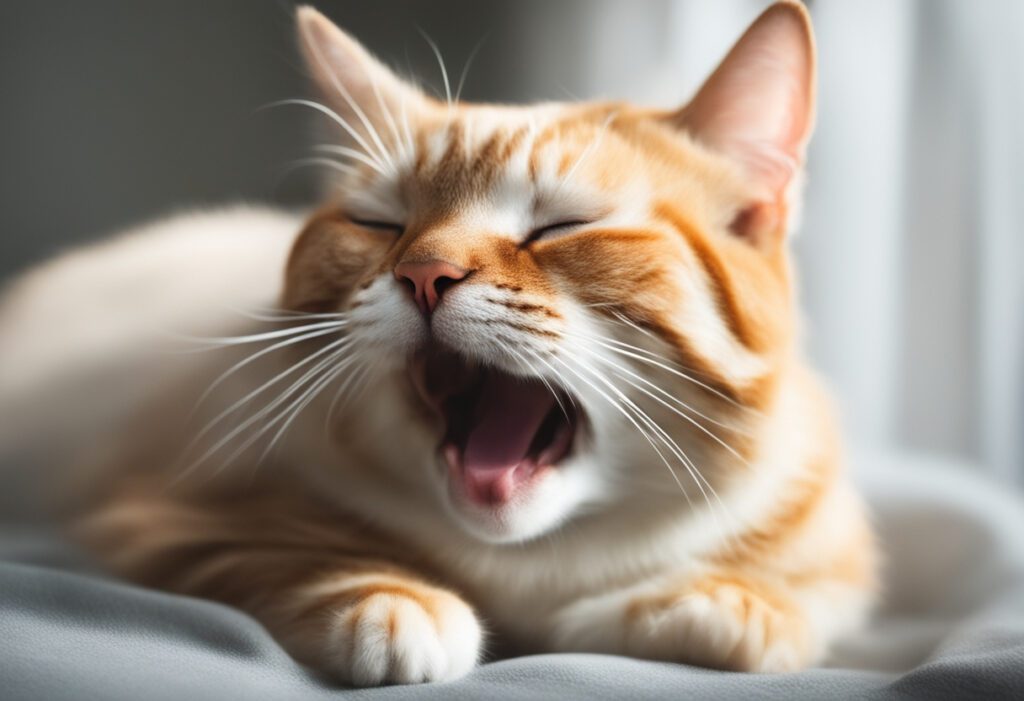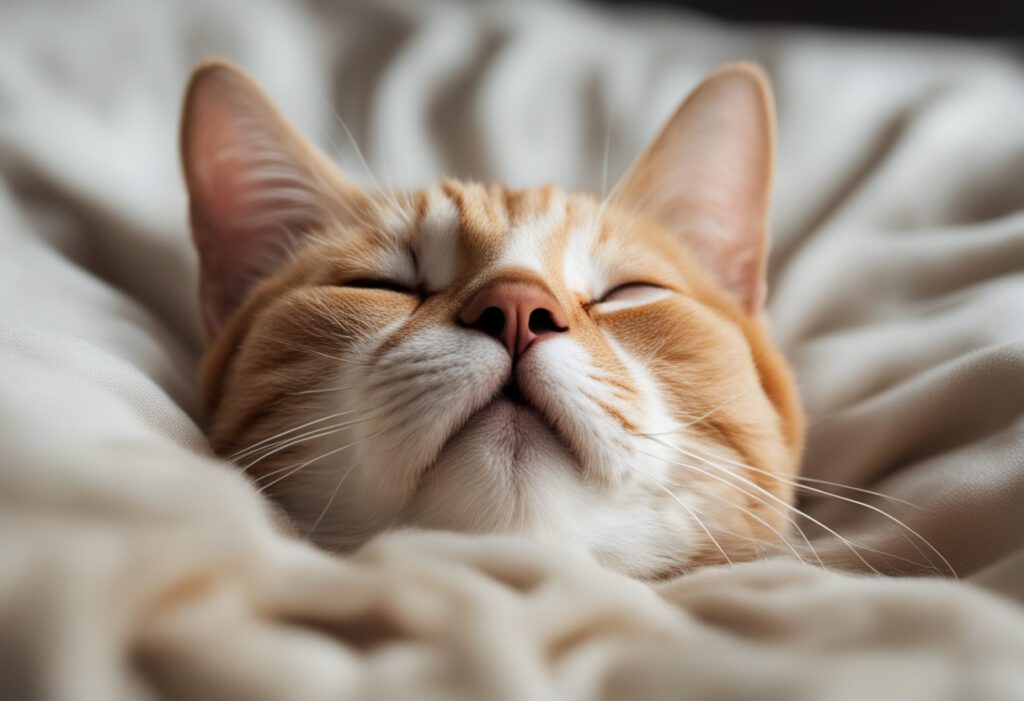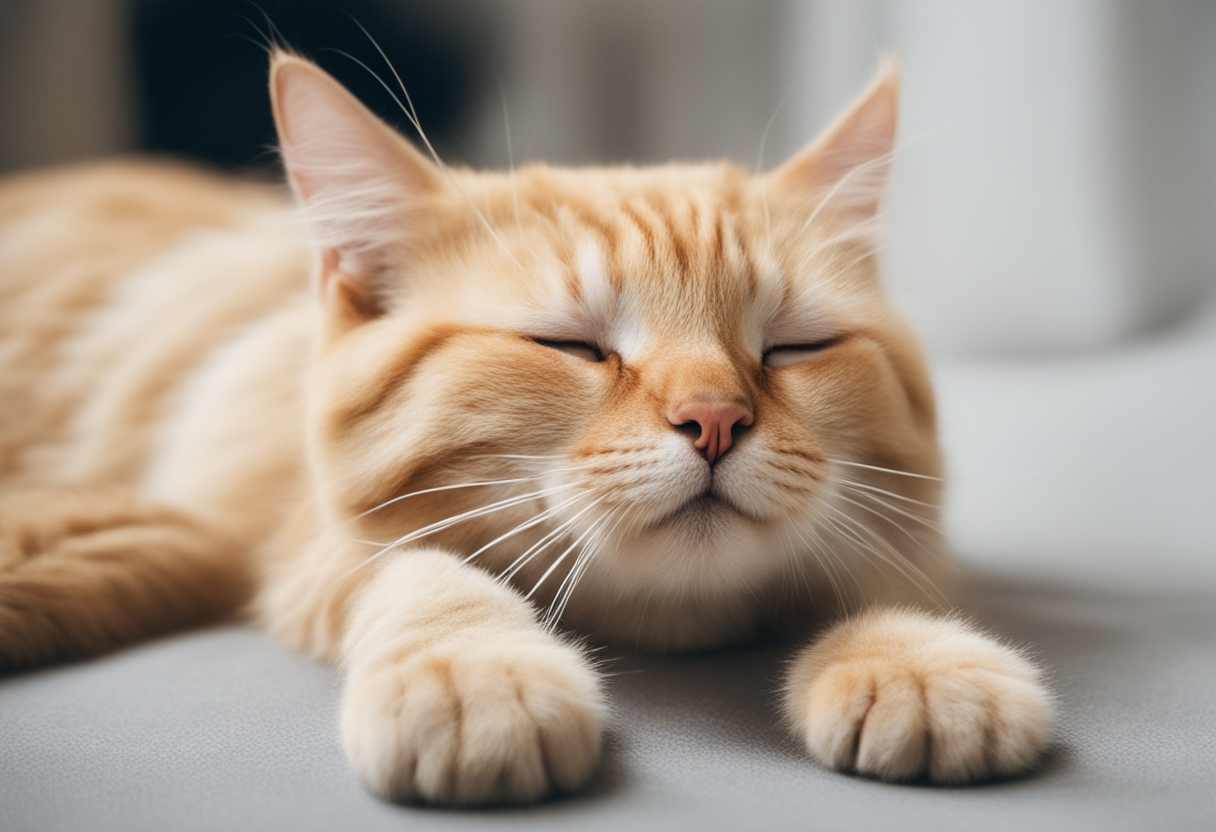Is your cat breathing heavily? This could be a sign of a serious issue. In this article, we’ll discuss the potential causes of heavy breathing in cats, such as respiratory infections, asthma, heart disease, allergies, and heatstroke.
We’ll also cover the symptoms to watch out for, how heavy breathing is diagnosed, available treatment options, and tips for preventing heavy breathing in your cat. If you’re concerned about your cat’s breathing, keep reading for more information.
What Causes a Cat to Breathe Heavily?

Breathing is a vital function for all living beings, but cats can experience heavy or labored breathing due to various health conditions and issues.
One of the common causes of heavy breathing in cats is asthma, which can lead to wheezing and coughing. Another potential factor is heartworm, a parasitic infection transmitted by mosquitoes, which can affect a cat’s respiratory system.
Cats may also experience heavy breathing due to congestive heart failure, a condition in which the heart is unable to pump blood effectively, leading to fluid buildup in the lungs. Respiratory infections, such as pneumonia or bronchitis, can also result in labored breathing in cats.
Respiratory Infections
Respiratory infections in cats can lead to abnormal breathing patterns, causing distress for the pet and concern for pet parents.
Cats with respiratory infections may exhibit symptoms such as coughing, sneezing, wheezing, or nasal discharge. It’s important for pet owners to observe any changes in their cat’s breathing and seek veterinary care if they notice abnormal signs.
Respiratory infections can be diagnosed through physical examination, blood tests, and imaging studies, allowing for proper identification of the underlying cause. Once diagnosed, treatment options may include antibiotics, antiviral medications, supportive care, and in some cases, hospitalization.
Asthma
Asthma is a common respiratory condition in cats, characterized by wheezing, coughing, and episodes of heavy breathing, requiring prompt veterinary care and attention from pet parents.
Cats affected by asthma may experience difficulty in breathing, prolonged coughing, and even blue-tinged gums indicating severe distress.
A veterinarian can diagnose asthma through a physical examination, chest x-rays, and pulmonary function tests.
Management often involves medications such as corticosteroids or bronchodilators, along with environmental modifications to minimize triggers like dust and cigarette smoke.
Pet parents play a crucial role in observing and reporting symptoms, administering prescribed medication, and creating a stress-free home environment for their feline friend.
Heart Disease
Heart disease in cats can manifest as heavy breathing, elevated body temperature, and may necessitate diagnosis through specialized tests and potential surgical procedures.
Heavy breathing, also known as dyspnea, is a common symptom of heart disease in cats and can be a result of fluid buildup in the lungs due to conditions like congestive heart failure. Other symptoms may include coughing, decreased appetite, and lethargy.
To diagnose heart disease, a veterinarian may perform a physical examination, blood tests, X-rays, and an electrocardiogram to evaluate the cat’s heart function. In some cases, an echocardiogram and cardiac ultrasound may be necessary to get a clear picture of the heart’s structure and function.
Treatment options for heart disease in cats may include medications to manage symptoms, such as diuretics to reduce fluid buildup, and ACE inhibitors to improve heart function. In severe cases, surgical interventions like pacemaker implantation or valve repair may be necessary to address specific issues.
Allergies
Allergies in cats can contribute to heavy breathing and other health issues, necessitating diagnosis and potential environmental changes to alleviate the symptoms.
Cats may experience respiratory distress due to allergens present in their environment, leading to symptoms such as coughing, wheezing, and sneezing. To diagnose allergies, veterinarians may conduct skin or blood tests to identify specific triggers.
Once diagnosed, environmental adjustments can play a crucial role in managing allergic reactions. These adjustments may involve minimizing exposure to allergens, such as dust, pollen, or mold, and using air purifiers or hypoallergenic bedding. By addressing the environmental factors contributing to the allergies, cat owners can help improve their pet’s respiratory health.
Heatstroke
Heatstroke in cats can lead to heavy breathing, elevated body temperature, and requires immediate attention from veterinary professionals to prevent further complications.
When a cat experiences heatstroke, their respiratory system can become severely affected, leading to labored breathing and potential distress. The elevated body temperature associated with heatstroke not only strains the respiratory system but also poses a risk to the overall health of the cat.
Immediate veterinary care is crucial to address these issues and prevent long-term repercussions. Without prompt intervention, the impact of heatstroke on a cat’s well-being can exacerbate, underscoring the critical need for pet owners to prioritize emergency veterinary care in temperature-related emergencies.
What Are the Signs of Heavy Breathing in Cats?
Recognizing the signs of heavy breathing in cats, such as rapid breathing or abnormal panting, is crucial for identifying potential health issues and seeking appropriate veterinary care.
Cats may exhibit variations in their breathing patterns, including shallow or rapid breaths, open-mouthed breathing, or wheezing. Normal respiratory behavior in cats involves quiet, rhythmic breathing through the nose.
However, abnormal panting, which is more commonly observed in dogs, can also signify respiratory distress in cats. When a cat’s breathing becomes labored, with an increased respiratory rate and effort, it may indicate various underlying conditions such as heart disease, lung problems, or respiratory infections.
Open-mouth Breathing
Open-mouth breathing in cats is a concerning sign of heavy breathing that warrants prompt attention from veterinary professionals and involvement of pet parents in monitoring the cat’s condition.
Cats typically breathe through their nose, so open-mouth breathing indicates a potential problem with their respiratory system or cardiovascular health.
It can be a symptom of heatstroke, respiratory infections, or heart disease, among other serious conditions. Pet owners should be vigilant in observing any changes in their cat’s breathing patterns and behavior, and seek immediate veterinary care if open-mouth breathing persists.
Early intervention is crucial in ensuring the well-being and health of the feline companion.
Wheezing or Coughing
Wheezing and coughing in cats may accompany heavy breathing and could indicate underlying respiratory infections, necessitating veterinary care and intervention.
When a cat exhibits signs of wheezing and coughing, it can be a concerning red flag for potential respiratory infections. These symptoms should not be taken lightly, as they may signify an underlying issue that requires prompt attention from a veterinarian.
Heavy breathing in cats can be a sign of various health problems, and respiratory infections are among the common causes. Seeking professional veterinary care is crucial in determining the root cause and providing the necessary intervention to ensure the cat’s well-being.
Rapid Breathing
Rapid breathing in cats is a concerning sign of heavy breathing that may warrant emergency veterinary care and expedited diagnostic procedures to identify the underlying cause.
This physiological response in felines can stem from various factors, such as respiratory infections, heart disease, stress, or even heatstroke.
When a cat exhibits rapid breathing, it could indicate an underlying health issue that requires prompt attention. Ignoring this symptom may lead to worsening of the condition, potentially posing a threat to the cat’s well-being. Therefore, it is crucial to seek professional evaluation, as veterinarians can conduct thorough assessments and tests to pinpoint the precise cause of the heavy breathing.
Difficulty Breathing
Difficulty breathing in cats can indicate heavy breathing and may lead to discomfort, necessitating comprehensive diagnosis and potential palliative care measures.
Heavy breathing in cats could be caused by a variety of respiratory issues, including asthma, bronchitis, heart disease, or even obstructions in the airways. Identifying the root cause of the breathing difficulty is essential for determining an appropriate treatment plan.
Due to the instinctual nature of cats to conceal signs of weakness, it can be particularly challenging to detect early indicators of respiratory distress. This emphasizes the importance of regular veterinary check-ups and awareness of subtle changes in a cat’s behavior or breathing patterns.
How Is Heavy Breathing in Cats Diagnosed?

The diagnosis of heavy breathing in cats often involves a comprehensive approach, including imaging tests like ultrasound, procedures such as chest taps, and evaluation of blood pressure to identify the underlying cause.
To begin the diagnostic process, a thorough physical examination is crucial. This includes observing the cat’s respiratory rate and pattern, as well as auscultating the lungs for abnormal sounds. Blood tests may also be conducted to check for any anomalies in the blood chemistry or organ functions.
Chest X-rays can provide valuable insight into the condition of the lungs and heart, allowing for the detection of any abnormalities or signs of disease. In some cases, more advanced imaging modalities such as CT scans or MRI may be necessary for a more detailed understanding of the respiratory system’s health. The veterinarian may also monitor the cat’s oxygen saturation levels to assess its respiratory function and overall health status.
What Are the Treatment Options for Heavy Breathing in Cats?
Treating heavy breathing in cats involves a range of options, including medications, surgical interventions, and palliative care measures to address the underlying health issues and provide relief to the feline patients.
Medications such as bronchodilators and corticosteroids are commonly prescribed to reduce inflammation in the airways and improve respiratory function in cats.
On the other hand, surgical procedures may be considered for cases where structural abnormalities or obstructions within the respiratory system are identified, such as in the case of a pulmonary mass or a collapsed trachea.
In some situations, when the underlying cause of heavy breathing cannot be completely resolved, palliative care becomes a crucial aspect of the treatment plan. This may involve providing oxygen therapy or adjusting the cat’s environment to minimize stress and promote comfort.
Medications
Medications play a crucial role in managing heavy breathing in cats, addressing conditions such as heart disease and preventing secondary bacterial infections that may exacerbate respiratory distress.
For instance, diuretics can help alleviate fluid buildup around the heart and lungs, easing the strain on the respiratory system. Bronchodilators aid in opening the airways, promoting easier breathing for felines with respiratory conditions.
Antibiotics may also be prescribed to combat bacterial infections that often accompany heavy breathing, reducing the risk of further complications. It’s important for cat owners to administer medications as directed by the veterinarian to ensure effective treatment and minimize potential side effects.
Oxygen Therapy
Oxygen therapy can provide essential respiratory support for cats experiencing heavy breathing, particularly in cases related to heart failure or compromised respiratory function.
Proper oxygen levels are vital for the body to function optimally. In cases of heavy breathing, increased oxygen uptake through therapy can alleviate the strain on the heart and lungs.
This can offer significant relief to cats suffering from heart failure, as adequate oxygen levels support cardiac function. By easing respiratory distress, oxygen therapy promotes better overall well-being and helps in managing the underlying causes of heavy breathing.
The provision of oxygen therapy in such instances can greatly improve the quality of life for affected cats.
Surgery
Surgical procedures may be necessary to address heavy breathing in cats, particularly in cases involving fluid accumulation around the lungs, or for specific conditions that may benefit from radiotherapy interventions.
Pleural effusion is a common cause of heavy breathing in cats. It often requires surgical intervention to drain the accumulated fluid and reduce pressure on the lungs.
In cases where tumors or certain growths are the cause, radiotherapy can offer targeted treatment to alleviate symptoms. Surgical procedures can also be vital in removing obstructions or addressing structural abnormalities that contribute to heavy breathing, providing significant relief to affected felines.
Environmental Changes
Implementing environmental changes, such as promoting pet dental health and providing a stress-free living environment, can contribute to managing heavy breathing and fostering overall well-being for cats.
In terms of pet dental health, maintaining good oral hygiene is vital in preventing respiratory issues in cats.
Regular dental check-ups and cleanings can help address underlying dental problems that may lead to heavy breathing.
Creating a stress-free living environment for cats is crucial in minimizing anxiety-related breathing difficulties.
Introducing calming measures, such as interactive toys, comfortable resting areas, and designated quiet spaces, can greatly reduce stress levels.
Utilizing featured images from sources like istockphoto can visually enhance content related to these environmental adjustments, providing a comprehensive resource for cat owners seeking to improve their pet’s well-being.
How Can Heavy Breathing in Cats Be Prevented?
Preventing heavy breathing in cats requires proactive measures, including regular veterinary care, monitoring body temperature, and the active involvement of pet parents in maintaining their feline companions’ health.
Regular veterinary check-ups are essential to monitor any underlying respiratory issues and to ensure early detection of potential concerns. Keeping a close eye on your cat’s body temperature can help identify signs of fever or distress.
Pet owners also play a crucial role in providing proper nutrition and creating a stress-free environment, which are integral to strengthening the respiratory system of their cats.
Keep Your Cat Cool
Keeping your cat cool is essential to prevent conditions such as heatstroke, excessive panting, and elevated body temperature that may lead to heavy breathing and discomfort.
As temperatures rise, it’s crucial to provide your feline companion with a cool environment to mitigate the risk of heatstroke. Cats are sensitive to heat and can quickly become distressed when exposed to high temperatures, leading to symptoms like panting and lethargy.
In hot weather, ensure they have access to shady spots, well-ventilated areas, and hydration to prevent dehydration. Avoid leaving them in cars or direct sunlight, as it can cause their body temperature to soar rapidly, posing a serious health threat.
Monitoring their behavior for signs of discomfort in warm conditions is pivotal. Consider using cooling mats or creating designated cool areas with tiles or marble surfaces for your feline friend to relax on. Remember, maintaining a cool environment goes a long way in safeguarding your beloved pet’s well-being and ensuring they stay comfortable and healthy during hot weather.
Keep Your Cat Stress-free
Creating a stress-free environment for your cat can minimize the risk of respiratory distress associated with conditions like allergies and neurologic disorders, promoting overall well-being and preventing heavy breathing.
This stress-free environment plays a crucial role in reducing the impact of allergens on your cat’s respiratory system. This decreases the likelihood of asthma attacks and allergic reactions.
A calm and peaceful setting can also help manage neurological conditions by lowering the levels of stress hormones. This ultimately supports better respiratory health for your cat.
By minimizing potential triggers and providing a serene atmosphere, you can help improve your feline companion’s overall respiratory function.
Regular Vet Check-ups
Regular veterinary check-ups play a pivotal role in preventing health issues such as anemia, maintaining optimal blood pressure, and identifying potential respiratory concerns before they escalate into heavy breathing.
These routine visits allow the veterinarian to monitor blood parameters closely, which is crucial for detecting any underlying conditions early on.
They provide an opportunity for the vet to assess the overall health and well-being of your feline friend, making it easier to address any respiratory conditions before they progress.
By prioritizing these check-ups, you can ensure your cat’s long-term health and happiness.
Frequently Asked Questions
What could be causing my cat to breathe heavily?
Heavy breathing in cats can be caused by a variety of factors, including respiratory infections, allergies, heart disease, or stress.
Is heavy breathing in cats always a sign of a serious health issue?
Not necessarily. While heavy breathing can be a symptom of a serious condition, it can also be a normal response to exercise, heat, or anxiety. If you notice your cat breathing heavily for an extended period of time, it’s best to consult a veterinarian.
Can my cat’s weight affect their breathing?
Yes, obesity can contribute to breathing difficulties in cats. Excess weight can put strain on their lungs and make it harder for them to breathe properly. If your cat is overweight, it’s important to work with a veterinarian to develop a weight management plan.
What should I do if my cat is breathing heavily?
If your cat is experiencing heavy breathing, it’s important to monitor their other symptoms and behavior. If they are also lethargic, not eating, or showing signs of distress, it’s best to seek immediate medical attention from a veterinarian.
Can I do anything to help my cat breathe easier?
Depending on the cause of your cat’s heavy breathing, there may be measures you can take to help them breathe easier. For respiratory infections, your veterinarian may prescribe medication. For allergies, removing allergens from your cat’s environment can help. Consulting with a veterinarian is the best way to determine the best course of action for your cat.
Is it normal for older cats to breathe heavily?
As cats age, they may develop health issues that can lead to heavy breathing. However, heavy breathing should not be considered a normal part of aging. If your senior cat is experiencing heavy breathing, it’s important to have them evaluated by a veterinarian to determine the cause and appropriate treatment.

